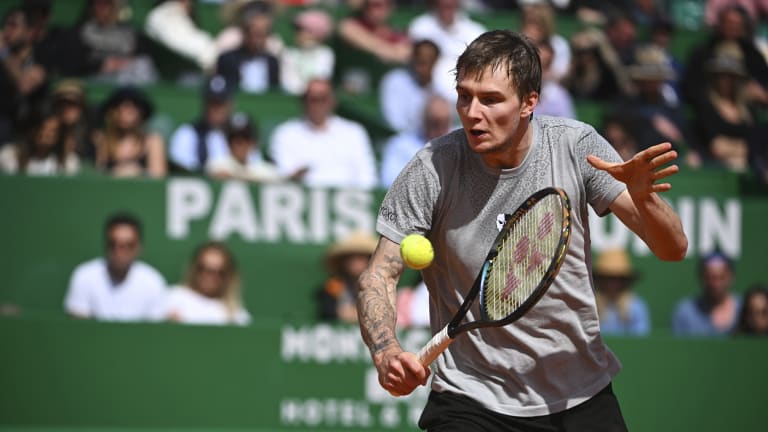ATP Monte Carlo, Monaco
Gotta bounce: Bublik’s Monte Carlo campaign ended in abrupt retirement
By Apr 14, 2022ATP Monte Carlo, Monaco
Monte Carlo takeaways: Alcaraz wins by playing for himself, one-handed backhands hold firm
By Apr 14, 2025ATP Monte Carlo, Monaco
Carlos Alcaraz overcomes worn-out Lorenzo Musetti for first title in Monte Carlo
By Apr 13, 2025ATP Monte Carlo, Monaco
Carlos Alcaraz vs. Lorenzo Musetti: Where to watch, and who will win, their Monte Carlo final
By Apr 12, 2025ATP Monte Carlo, Monaco
Carlos Alcaraz charges past Alejandro Davidovich Fokina to reach Monte Carlo final
By Apr 12, 2025ATP Monte Carlo, Monaco
Alex de Minaur: 6-0, 6-0 win over Grigor Dimitrov in Monte Carlo was 'bizarre'
By Apr 11, 2025ATP Monte Carlo, Monaco
Carlos Alcaraz vs. Alejandro Davidovich Fokina: Where to Watch, Monte Carlo Preview, Betting Odds
By Apr 11, 2025ATP Monte Carlo, Monaco
Alex de Minaur vs. Lorenzo Musetti: Where to Watch, Monte Carlo Preview, Betting Odds
By Apr 11, 2025ATP Monte Carlo, Monaco
Carlos Alcaraz waits for his chances to clinch first clash with Arthur Fils in Monte Carlo
By Apr 11, 2025ATP Monte Carlo, Monaco
Stefanos Tsitsipas vs. Lorenzo Musetti: Where to Watch, Monte Carlo Preview, Betting Odds
By Apr 10, 2025Gotta bounce: Bublik’s Monte Carlo campaign ended in abrupt retirement
The Kazakh was the latest player to call it quits mid-match in the last few weeks—a growing trend where typical protocol overseen by umpires is ignored.
Published Apr 14, 2022
Advertising
Advertising
Advertising
Advertising

Bublik was serving for the match in the second set against Carreno Busta, but abruptly retired after dropping serve in the third set.
© Sipa USA via AP